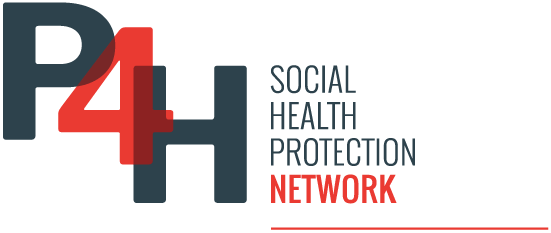Context
The International Seminar on Universal Health Coverage, organized by the Caisse Nationale d’Assurance Maladie de Côte d’Ivoire (CNAMCI) from November 7 to 10, bears witness to the importance of the issue of health coverage, as well as the need to make demand more solvent, access to care and protection against financial risk. Political support for this priority theme was demonstrated by the presence at the opening of the seminar of the Prime Minister, the Minister for Health, the Minister for Social Protection, the Representative of the President of the Republic for health issues, and the Minister for Social Affairs of the Republic of Benin. The latter two personalities took part in all the debates and exchanges.
Issues
The CNAMCI was set up recently (less than two years ago) and is currently running a pilot program for student enrolment, in order to test its processes for managing enrolment in the scheme, as well as the payment of benefits corresponding to a basket of care that has yet to be precisely determined. It should be noted that the single contribution is set at 1,000 CFA per person per month, on a flat-rate basis, with no progression according to income. What’s more, the test sample of the test population does not pay any contributions. Finally, the collection of contributions will not a priori require duplication of the system already set up within the framework of the national social welfare fund (IPS-CNPS), which will broaden the collection base provided for other social benefits.
The operationalization of insurance coverage faces a number of challenges that need to be resolved, in order to enable CNAMCI to ramp up its activity and the volume of contributors and beneficiaries:
– management and collection costs, given the low quota levels
– definition of the basket of care in an evolving manner, based on an understanding of costs ;
– social protection mechanisms extended to segments of the population included in the informal economy;
– risks of fragmentation by multiplying the number of management and coverage bodies for different segments of the population (e.g. management of the self-employed, salaried employees and the destitute in Morocco).
Côte d’Ivoire’s healthcare offer is characterized by a multiplicity of levels of care:
– 4 regional university hospitals (CHUR) and specialized institutes
-17 regional hospitals (CHR)
– 84 general hospitals
– 1948 healthcare facilities
– 1 wholesale distributor
When it comes to the distribution of healthcare professionals (particularly doctors, pharmacists, nurses and midwives), international standards are being met in the public sector. The private healthcare sector is in a state of continuous expansion.
The Ministry of Health has identified priority needs in terms of reinforcing the healthcare offer, and shared the following prioritized conclusions during the seminar:
– infrastructure and equipment reinforcement ;
– Quantitative and qualitative upgrading of human resources (with the introduction of appropriate training programs);
– networking of facilities and investment in information systems, support for the implementation of a patient medical record;
– availability and management of the medication circuit ;
– support for the integration of regulatory requirements, particularly in terms of codification and standardization for healthcare establishments (including bringing infrastructures and equipment up to standard)
CNAMCI’s position
In response to the needs expressed, CNAMCI intends to step up its efforts to pool management tools, and benefit from external support (legal expertise) in the fields of contractualization, codification and standardization.
More generally, decision-makers in Côte d’Ivoire, as well as representatives from Benin, Morocco, Niger and Senegal, called for institutional and legal support in defining contractualization and PPP models in the health and social protection sector, in order to meet forward-looking needs for infrastructure and equipment reinforcement, as well as quality services.
In addition, the CNAMCI Managing Director insisted on the need to set up effective management tools for financing and anticipating the evolution of healthcare costs, and expressed his wish to benefit from the support of the WHO, and more specifically the EAE unit, in order to understand the possibilities of efficiency management and intervention optimization tools.
Other issues, such as the constitutionalization of a right to health, or the enforceability of this right against third parties, while most supra-legislative standards providing for the implementation of a response to health needs as an obligation devolving on the public entity do not mention a right to health as such.
The World Bank and Benin’s Minister of Social Affairs also emphasized the need to anticipate the rise in chronic illnesses, their impact on healthcare expenditure and the balance of health insurance schemes, as well as the need to resize the healthcare offering in order to integrate new services and professions in the medico-social sector.
In this field, the presentation of Japan’s health and social care system led to the conclusion that the availability of high-quality, adequate healthcare is the best investment to encourage people to subscribe to health insurance systems.
With regard to complex contractualization tools and public-private partnerships, the presentation given by WHO/P4H highlighted the FIT (Foundations, Institutions, Transformation) strategy and the legal-technical support offered to adapt legislative, regulatory and contractual frameworks to the needs of healthcare decision-makers;
The presentation therefore focused on an operational overview of the various complex contractualization models in the healthcare sector (concessions, leasing and public service delegations on the one hand, infrastructure arrangements and ancillary services on the other), the contractual efficiency of these models in terms of cost control, and the performance objectives assigned to these arrangements.
A large number of questions were asked by participants, including the CNAMCI Managing Director, the Representative of the President of the Republic, the Benin Minister of Social Affairs and the World Bank Representative (as well as representatives from the Ministries of Health in Côte d’Ivoire, Morocco, Niger and Senegal). These questions, followed by a request for legal support, focused on the following aspects:
– the modelling of PPP contracts and the public law prerogatives exorbitant to common law (such as the powers of modification and unilateral termination of the contract without fault of the contracting party of the public entity, generally recognized by administrativist jurisprudence);
– the possibility of providing programs to support the development of institutional capabilities in the management of complex, long-term contracts;
– the provision of international case studies to assess the ability of PPPs to meet the diversity of healthcare needs;
– the range of skills in contract negotiation and management that decision-makers in charge of steering the healthcare system need to optimize the use of PPPs;
– the opportunity to map the private healthcare sector and derive a number of contractual options based on the priorities selected by public decision-makers;
– legal support to define regulations tailored to the specific needs of the healthcare sector, derived from the generally generic PPP legislation;
– mechanisms for preventing contractual disputes linked to PPPs and complex contracts in the healthcare and social protection sectors;
– the articulation of roles and responsibilities between public bodies, and in particular between the national level and local authorities, as well as healthcare establishments when these have legal personality.
The high quality of the exchanges attested to the participants’ mastery of healthcare policies and systems, and will undoubtedly pave the way for further collaboration with the P4H network, which many stakeholders have been calling for.

